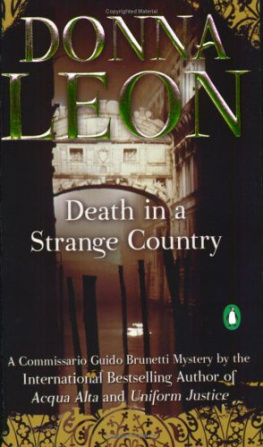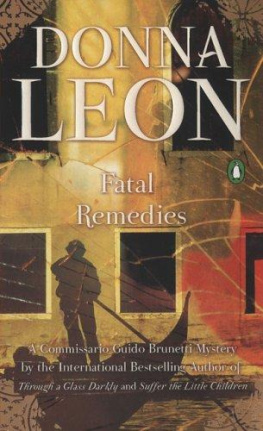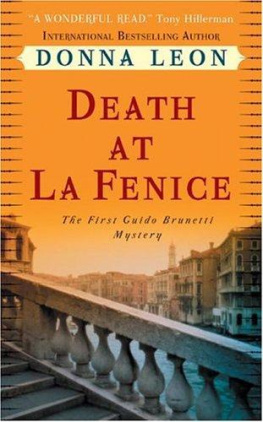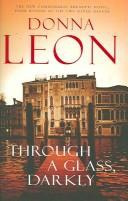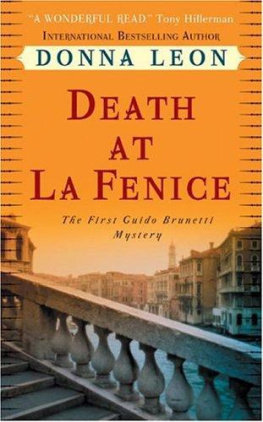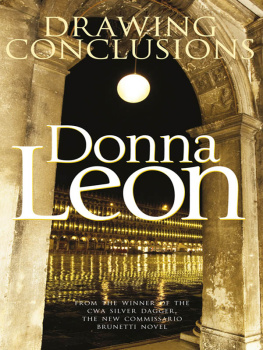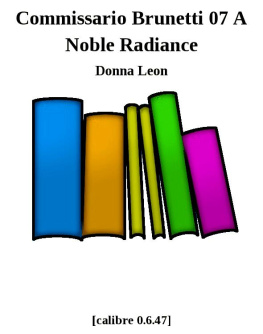Donna Leon has lived in Venice for many years and previously lived in Switzerland, Saudi Arabia, Iran and China, where she worked as a teacher. Her previous novels featuring Commissario Brunetti have all been highly acclaimed; recently Friends in High Places, which won the CWA Macallan Silver Dagger for Fiction, Blood From A Stone, Through a Glass, Darkly and Suffer the Little Children.
Praise for The Girl of His Dreams
'The Girl of his Dreams is an artful examination of family ties as well as a clear-eyed survey of the pros and cons of political correctness.' Evening Standard
'The seventeenth title in an excellent, unflagging series... The Girl of His Dreams marks an evolution, even a quiet revolution, in Leon's storytelling.' TLS
'Donna Leon has a talent for scene-setting and plot-twisting which has hooked in millions of fans, and if you've never sampled their wares, there couldn't be a better place to start than this.' Sunday Telegraph
Also by Donna Leon
DONNA
LEON
the GIRL of his
DREAMS
arrow books
Published by Arrow Books 2009
9753
Copyright Donna Leon and Diogenes Verlag AG Zurich, 2008
Donna Leon has asserted her right under the Copyright, Designs and Patents Act, 1988 to be identified as the author of this work.
This book is sold subject to the condition that it shall not, by way of trade or otherwise, be lent, resold, hired out, or otherwise circulated without the publisher's prior consent in any form of binding or cover other than that in which it is published and without a similar condition including this condition being imposed on the subsequent purchaser.
First published in Great Britain in 2008 by William Heinemann
Arrow Books
Random House, 20 Vauxhall Bridge Road, London SW1V 2SA
environment
Typeset in Palatino by Palimpsest Book Production Limited,
Grangemouth, Stirlingshire Printed in the UK by CPI Bookmarque, Croydon, CRO 4TD
For Leonhard Toenz
Der Tod macht mich nicht beben.
Nur meine Mutter dauert mich;
Sie stirbt vor Gram ganz sicherlich.
Death does not make me tremble.
I feel sorry only for my mother.
She will surely die of grief.
Die Zauberflote Mozart
Brunetti found that counting silently to four and then again and again allowed him to block out most other thoughts. It did not obscure his sight, but it was a day rich with the grace and favour of springtime, so as long as he kept his eyes raised above the heads of the people around him, he could study the tops of the cypress trees, even the cloud-dappled sky, and what he saw he liked. Off in the distance, if only he turned his head a little, he could see the inside of the brick wall and know that beyond it was the tower of San Marco. The counting was a sort of mental contraction, akin to the way he tightened his shoulders in cold weather in the hope that, by decreasing the area exposed to the cold, he would suffer it less. Thus, here, exposing less of his mind to what was going on around him might diminish the pain.
Paola, on his right, slipped her arm through his, and together they fell into step. On his left were his brother
Sergio, Sergio's wife, and two of their children. Raffi and Chiara walked behind him and Paola. He turned and glanced back at the children and smiled: a frail thing, quickly dissipated in the morning air. Chiara smiled back; Raffi lowered his eyes.
Brunetti pressed his arm against Paola's, looking down at the top of her head. He noticed that her hair was tucked behind her left ear and that she was wearing the gold and lapis earrings he had given her for Christmas two years before. The blue of the earring was lighter than her dark blue coat: she had worn that and not the black one. When had it stopped, he wondered, the unspoken demand that black be worn at funerals? He remembered his grandfather's funeral, with everyone in the family, especially the women, draped in black and looking like paid mourners in a Victorian novel, though that had been well before he knew anything about the Victorian novel.
His grandfather's older brother had still been alive then, he remembered, and had walked behind the casket, in this same cemetery, under these same trees, behind a priest who must have been reciting the same prayers. Brunetti remembered that the old man had brought a clod of earth from his farm on the outskirts of Dolo -long gone now and paved over by the autostrada and the factories. He recalled the way his great-uncle had taken his handkerchief from his pocket as they stood silently around the open grave as the coffin was lowered into it. And he remembered the way the old man - he must have been ninety, if a day - had folded back the fabric and taken out a small clod of earth and dropped it on to the top of the coffin.
That gesture remained one of the haunting memories of his childhood, for he never understood why the old man had brought his own soil, nor had anyone in the family ever been able to explain it to him. He wondered, standing there now, whether the whole scene could have been nothing more than the imagination of an overwrought child, struck into silence by the sight of most of the people he knew shrouded in black and by the confusion that had resulted from his mother's attempt to explain to his six-year-old self what death was.
She knew now, he supposed. Or not. Brunetti was prone to believe that the awfulness of death lay precisely in the absence of consciousness, that the dead ceased to know, ceased to understand, ceased to anything. His early life had been filled with myth: the little Lord Jesus asleep in his bed, the resurrection of the flesh, a better world for the good and faithful to go to.
His father, however, had never believed: that had been one of the constants of Brunettes childhood. He was a silent non-believer who made no comment on his wife's evident faith. He never went to church, absented himself when the priest came to bless the house, did not attend his children's baptisms, first communions, or confirmations. When asked about the subject, the elder Brunetti muttered, 'Sciocchezze or 'Roba da donne', and did not pursue the topic, leaving his two sons to follow him if they wanted in the conviction that religious observation was the foolish business of women, or the business of foolish women. But they'd got him in the end, Brunetti reflected. A priest had gone into his room in the Ospedale Civile and given the dying Brunetti the last rites, and a mass had been said over his body.
Perhaps all of this had been done to console his wife. Brunetti had seen enough of death to know what a great comfort faith can be to those left behind. Perhaps this had been in the back of his mind during one of the last conversations he had with his mother, well, one of the last lucid ones. She had still been living at home, but already her sons had had to hire the daughter of a neighbour to come and spend the days with her, and then the nights.
In that last year, before she had slipped away from them entirely and into the world where she had spent her last years, she had stopped praying. Her rosary, once so treasured, had gone; the crucifix had disappeared from beside her bed; and she had stopped attending Mass, though the young woman from downstairs often asked her if she would like to go.



